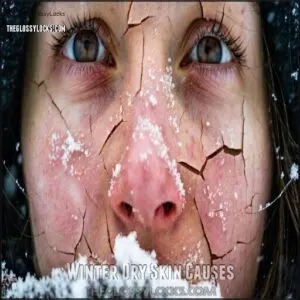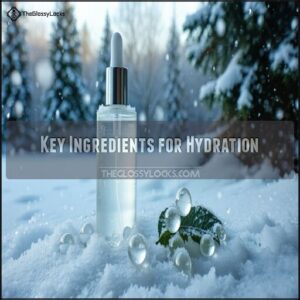This site is supported by our readers. We may earn a commission, at no cost to you, if you purchase through links.

Start by showering with lukewarm water instead of hot, which strips natural oils. Apply moisturizer immediately after bathing while skin is still damp—this locks in moisture when your skin needs it most.
Invest in a good humidifier for your bedroom to combat dry indoor heating. Don’t forget to drink plenty of water; hydration works from inside out.
Switch to cream-based cleansers rather than drying foams or gels. Like a bear preparing for hibernation, your skin needs extra protection during these cold months. The right oils can transform your winter skin experience completely.
Table Of Contents
- Key Takeaways
- Winter Dry Skin Causes
- Risk Factors for Dry Skin
- Importance of Hydration
- Effective Moisturization
- Preventive Measures for Dry Skin
- Managing Dry Itchy Skin
- Year-Round Skin Health
- Maintaining Healthy Skin
- Frequently Asked Questions (FAQs)
- How do I keep my skin hydrated in winter?
- How to be hydrated in winter?
- How do you hydrate combination skin in the winter?
- What is the best skin care routine for winter?
- How does medication affect winter skin dryness?
- Can specific fabrics worsen skin irritation?
- Do hormonal changes impact winter skin hydration?
- Is skin dry mouth related to dehydration?
- How does high altitude affect skin moisture?
- Conclusion
Key Takeaways
- Use lukewarm water instead of hot for showering as hot water strips your skin’s natural oils, then apply moisturizer immediately while skin is still damp to lock in moisture.
- Invest in a humidifier for your bedroom to combat the drying effects of indoor heating, creating an environment that helps your skin retain moisture overnight.
- Switch to cream-based cleansers and thick moisturizers containing ceramides, hyaluronic acid, or glycerin to strengthen your skin’s protective barrier against harsh winter conditions.
- Don’t forget internal hydration—drink plenty of water and incorporate omega-rich foods like salmon and avocados to support your skin’s health from the inside out.
Winter Dry Skin Causes
Winter’s cold air and dry indoor heating strip moisture from your skin, while low humidity makes it harder to stay hydrated.
These conditions weaken your skin’s barrier, causing water loss and leaving it rough, itchy, and sensitive.
Low Humidity Effects
When humidity drops, your skin’s stratum corneum, the outermost layer, struggles to hold moisture.
Winter conditions amplify this evaporation increase, leading to noticeable dryness and sensitivity.
Without enough hydration, moisture loss leaves your skin feeling tight and uncomfortable.
Prioritize winter skincare by addressing low humidity effects—layer on thick moisturizers and follow practical winter hydration tips for dry skin relief, focusing on dry skin.
Cold Air Impact
When frigid winter air hits your skin, it pulls moisture away, leaving it parched and flaky.
Low humidity levels intensify this effect, especially during prolonged cold exposure.
Your skin’s sensitivity spikes as the protective barrier struggles to retain hydration.
Winter skincare routines focusing on skin hydration can bring much-needed dry skin relief, keeping you comfortable in harsh, cold, dry air, with a focus on dry skin relief.
Indoor Heating Consequences
Indoor heating can dry out your skin fast by stripping air moisture, leaving it parched and sensitive.
Heater dehydration worsens winter skin care woes, often making dry skin itchier.
Crank down your thermostat settings to reduce skin sensitivity, and consider a humidifier.
Humidifier benefits include boosting indoor air moisture, helping improve winter skin hydration for less irritation and better skin health, which can lead to improved skin health and reduced skin sensitivity.
Skin Barrier Function
Cold air and indoor heating can weaken the skin barrier, allowing moisture to escape.
This layer, made of lipid composition and ceramides, relies on its integrity to prevent TEWL (Transepidermal Water Loss).
Winter skin care should focus on hydration and barrier repair. Use a moisturizer packed with ceramides to restore your stratum corneum and shield it from environmental impacts.
Risk Factors for Dry Skin
Dry skin isn’t just about colder weather—it’s also influenced by your age, health, and daily habits.
From harsh soaps to frequent washing, certain factors can weaken your skin’s ability to retain moisture.
Age and Skin Health
As you age, your skin produces less oil, making it drier and more vulnerable in winter.
Age-related dryness stems from a weakening barrier, so your winter skincare routine needs extra hydration.
Mature skin hydration demands thicker creams with ceramides or hyaluronic acid.
Many experts recommend dermatologist-approved moisturizers for this condition.
Preserve youthful skin by moisturizing daily, prioritizing gentle products, and embracing an elderly skincare routine that locks in moisture effectively.
Health Conditions and Dry Skin
Health conditions like eczema, diabetes, and hypothyroidism can worsen dry skin, leading to barrier damage and heightened sensitivity.
Rosacea often flares, while vitamin C deficiency impacts overall skin health.
Allergy-related irritation adds to the struggle by aggravating skin conditions.
Keep these factors in mind, and be gentle with your skin—it’s your barrier against the world, considering your overall skin health.
Harsh Soaps and Chemicals
Harsh soaps can wreck your skin’s moisture barrier, leaving it dry and irritated. Watch out for irritant ingredients in products. Switch to safe alternatives labeled “gentle” or “moisturizing” to avoid chemical sensitivity.
Winter skin care thrives on protecting hydration, so stick to these tips:
- Use fragrance-free skin care products.
- Avoid harsh detergents.
- Choose non-stripping cleansers.
- Read product labels carefully to ensure you are using the right products for your skin, focusing on moisturizing properties.
Frequent Washing and Skin Stripping
Frequent washing can strip away your skin’s natural oils, causing winter skin dehydration. Over-washing effects worsen with hot water or harsh soap damage.
Opt for a gentle cleanser choice and try handwashing alternatives like hand sanitizer when possible. Follow up any washing with moisturizing frequency to lock in hydration.
These dry skin solutions are essential for winter skin care and hydration.
| Problem | Solution |
|---|---|
| Stripped natural oils | Use gentle cleansers |
| Hot water usage | Wash with lukewarm water |
| Harsh soaps | Replace with mild formulas |
| Frequent washing | Limit unnecessary washes |
| Dry hands | Moisturize after handwashing |
Importance of Hydration
Keeping your skin hydrated might feel like a challenge during winter, but it’s essential for maintaining a healthy complexion.
Proper hydration helps your skin hold moisture, enhances its protective barrier, and prevents dryness caused by cold air and indoor heating, which is crucial for a comfortable complexion.
Drinking Water Benefits
Drinking water promotes skin elasticity, aids cellular hydration, and supports overall health.
While it isn’t a magic fix for dry skin, consistent water intake improves your body’s ability to flush toxins, indirectly benefiting skin hydration.
For winter skin care, pair water intake with external moisturizers. Remember, balanced hydration—from the inside and out—is among the smartest skin hydration tips this season, including the importance of skin elasticity and overall health!
Humidifier Usage
When drinking water isn’t enough, using a humidifier helps keep your skin hydrated indoors during winter.
Here’s how to moisturize with healthier air:
- Maintain indoor humidity between 30-50% for ideal hydration.
- Choose between cool-mist, warm-mist, or ultrasonic types of humidifiers.
- Regularly clean your humidifier to avoid bacteria.
- Pair humidifier benefits with moisturizers for winter skin care.
For increased moisture, consider a cool mist option to enhance the moisturize effect.
Moisturizer Application
Right after bathing, apply a thick moisturizer to lock in moisture and hydrate skin effectively.
Focus on targeted areas like elbows and knees, use proper application techniques, gently massaging the product.
Reapply throughout the day for consistent protection, and for winter skin care routines, layering hydrating serums under your moisturizer boosts results.
Stick to this moisturizing routine for lasting skin hydration, ensuring that your skin remains healthy and protected throughout the year.
Skin Hydration Strategies
After applying a moisturizer, enhance hydration by layering a hydrating serum underneath.
Focus on occlusive barriers like squalane or ceramides to lock in moisture.
For a strong post-shower routine, pat your skin gently and immediately apply cream or balm.
These skin hydration tips for winter will keep dryness away, making your winter skin care routine simple and effective, with a focus on winter skin care.
Effective Moisturization
To keep your skin soft and hydrated during winter, it’s essential to focus on effective moisturization.
Using the right products, like thick creams, ointments, or those with hydrating ingredients, helps lock in moisture and rebuild your skin’s protective barrier.
Thick Moisturizers and Ointments
For winter skin care, opt for thick moisturizers or ointments packed with occlusive ingredients like petroleum jelly or shea butter.
These create a barrier to lock in hydration. Balms are perfect for the driest areas, while layering serums under your moisturizer boosts moisture retention.
Consider moisturizers with hyaluronic acid, as they boost skin elasticity.
Use night treatments to repair and replenish your skin—essential skin hydration methods for winter’s harsh conditions.
Natural Oils and Skin Health
How can natural oils boost your skin health?
Oils like squalane and jojoba offer deep hydration and repair your lipid barrier, keeping dryness at bay.
Vitamin E is a powerhouse for winter skin care, soothing and nourishing.
Using natural oils in your routine enhances skin hydration while protecting against harsh conditions, making them essential skin care tips for winter.
Key Ingredients for Hydration
Ingredients like hyaluronic acid, ceramides, and glycerin are hydration heroes.
Each one works its magic:
- Hyaluronic Acid: Attracts and holds water, keeping skin plump.
- Ceramides: Restore your skin barrier, sealing in moisture to prevent dryness.
- Glycerin: Draws hydration to your skin, leaving it smoother.
These boost skin health, repair barriers, and maintain lasting softness.
You can find a hyaluronic acid serum for enhanced hydration.
Creams and Ointments for Dry Skin
When battling winter skin problems, reach for thick creams or ointments.
These pack occlusive ingredients that lock in moisture and stop water from escaping.
Look for humectant benefits from hyaluronic acid or glycerin and emollient properties like shea butter for soothing relief.
Lipid restoration with ceramides can also fortify your barrier.
For tough cases, prescription creams may help.
Preventive Measures for Dry Skin
Preventing dry skin is all about protecting your skin’s natural barrier and minimizing moisture loss.
By using gentle cleansers, wearing protective clothing, and limiting harsh outdoor exposure, you can keep your skin feeling soft and healthy all winter long.
Gentle Cleansers and Soaps
A gentle cleanser makes all the difference for winter skin care.
Harsh soaps can strip your skin, so swap them for these alternatives:
- Sulfate-free cleansers: They cleanse without over-drying, ideal for maintaining skin hydration.
- Creamy cleansers: Perfect for comforting your skin during colder months.
- Syndet bars or pH-balanced soaps: Gentle on dry skin, protecting its natural barrier.
Protective Clothing and Accessories
Protecting your skin starts with smart fabric choices.
Opt for nonirritating fabrics like cotton or silk to avoid itchiness. Gloves are a must—cold, dry air can wreak havoc on your hands.
A snug hat keeps your head warm while shielding delicate skin. Wrap up with a scarf to block icy winds, maintaining your skin’s moisture barrier and comfort.
Limited Outdoor Exposure
After bundling up with layered clothing to shield your skin, try minimizing exposure to cold, dry winds to avoid windburn.
Opt for indoor activities when possible, and don’t skip sunscreen—UV rays don’t vanish in winter!
Keep winter moisturizers handy and focus on skin hydration products to repair your skin barrier, keeping your dry skin soothed and protected.
Managing Dry Itchy Skin
If your skin feels itchy and irritated during winter, it’s a clear sign your skin needs extra care and hydration.
Simple steps like using overnight treatments and avoiding harsh products can make a big difference in soothing discomfort.
Overnight Treatments and Masks
Overnight treatments are a goldmine for winter skin care, offering deep hydration while you sleep.
Choose a mask suited to your skin type, packed with ingredients like hyaluronic acid or glycerin for the best results. Apply generously on clean skin, let it work overnight, and wake up refreshed.
You can find a suitable overnight hydration mask online.
- Hydration benefits: Restores moisture.
- Mask ingredients: Aloe vera, ceramides.
- Application techniques: Smooth evenly.
- Product selection: Laneige, COSRX.
- Skin type: Customized options.
Exfoliation and Skin Care
Finding the right exfoliation frequency is essential for winter skincare.
Stick to gentle exfoliants, like lactic acid or a soft washcloth, and focus on nurturing sensitive skin.
Post-exfoliation care matters—apply a rich moisturizer immediately to lock in hydration.
These skin hydration techniques restore balance without stripping moisture, ensuring your dry skin feels refreshed and smooth throughout the chilly months.
Patting Dry and Gentle Touch
After exfoliating, switch to gentle drying to keep your skin supple.
Use soft towels and lightly pat—don’t rub—your skin dry. Patting benefits include reduced irritation, especially for sensitive skin needing extra care in winter.
It’s one of the top skin hydration techniques. Pair this with gentle cleansers to keep moisture locked in and maximize skin hydration advice for winter skin care.
Using products with ceramides helps restore the skin’s lipid balance.
Avoiding Irritants and Allergens
When caring for your skin, gentle touch is just the beginning.
Your winter skin care should also avoid common irritants that trigger redness and inflammation.
Skip scented products, harsh detergents, and dryer sheets that strip natural oils from sensitive skin.
Choose soft, natural fabric clothes that won’t scratch or irritate, and replace standard cleansers with gentle cleansers formulated specifically for sensitive skin winter conditions to prevent skin irritation and maintain natural oils.
Year-Round Skin Health
You’ll need to maintain your skincare routine through all seasons, not just winter, to keep your skin healthy and hydrated year-round.
Your skin’s needs change with the weather, so you’ll want to adjust your products accordingly while maintaining the core habits of cleansing, moisturizing, and protection.
Consistent Skincare Routine
Why does consistency matter so much for winter skin care?
A daily skincare routine delivers major benefits when temperatures drop. Apply products in the correct order—cleanser, toner, serum, then moisturizer—to maximize hydration.
Tailor your routine to your specific skin type for best results. These daily habits lead to impressive long-term effects, preventing the moisture loss that plagues winter skin.
Stick with it—your skin’s barrier will thank you, and remember daily habits are key to maintaining healthy skin.
Hydrating Foods and Drinks
While you maintain your skincare regimen, don’t forget that hydration starts from within.
Your diet directly impacts skin health, especially during winter. Water-rich foods like cucumbers, watermelon, and strawberries deliver hydration directly to your cells.
Sipping herbal teas throughout the day provides both warmth and moisture. Timing your hydration matters too—try drinking water before meals for ideal skin benefits.
These dietary choices complement your topical treatments for truly healthy winter skin.
Electrolyte-Rich Beverages
Looking beyond plain water, electrolyte-rich beverages play a vital role in winter skin hydration.
When you’re naturally less thirsty during colder months, these drinks help maintain your body’s moisture balance and support skin health from within.
- Coconut water with a splash of lime for natural electrolytes without added sugars
- Warm herbal teas infused with minerals like magnesium and potassium
- Homemade electrolyte drinks using sea salt, honey, and citrus to help maintain your body’s moisture balance and support skin health.
Skin-Nourishing Foods and Supplements
While drinks hydrate from within, your skin also craves nourishment from skin-nourishing foods.
Omega-3 fatty acids found in fatty fish strengthen cell walls and reduce inflammation. Healthy fats from avocados and nuts boost skin elasticity and flexibility.
Vitamin intake, particularly vitamin E in nuts and seeds, protects against oxidative damage. For supplement benefits, consider fish oil capsules with omega-3s to combat winter dryness and support gut health.
Maintaining Healthy Skin
You’ll need a consistent routine to maintain healthy skin during winter’s harsh conditions.
Your skin requires proper hydration, gentle care, and protection from environmental stressors to stay soft and resilient through the cold months, which is crucial for healthy skin.
Avoiding Over-Exfoliation
While maintaining year-round skin health requires attention, your exfoliation habits need special consideration during winter.
Limit exfoliation to once weekly to protect your skin barrier from unnecessary damage. Choose gentle methods like soft washcloths rather than harsh scrubs.
After exfoliating, immediately apply hydrating products to replenish moisture. Your winter skincare routine should focus on balance—removing dead cells without compromising your skin’s natural protective layer, which is crucial for maintaining skin health.
Staying Hydrated and Healthy
While exfoliation matters, what you put into your body directly impacts your skin’s health. Your skin moisture barrier thrives when you’re hydrated from within.
- Drink at least 8 glasses of water daily for ideal internal hydration
- Incorporate omega-rich foods like salmon, walnuts, and avocados into your dietary choices
- Consider collagen or hyaluronic acid supplement options, especially during winter skin care season
A consistent routine, guided by a dermatologist, is essential for superior skin health. healthy skin habits Quality sleep also supports skin regeneration, making winter skin hydration a 24-hour commitment.
Protecting Skin From Harsh Elements
While hydration from within supports your skin, external protection is equally important.
Create a Winter Skin Shield by wearing soft, non-irritating fabrics like cotton and silk.
Sunscreen Importance remains year-round—UV rays penetrate clouds and reflect off snow.
Smart Clothing Choices include gloves, scarves, and face coverings on bitterly cold days.
Limit Exposure to harsh winds, and use a humidifier at home to counteract winter’s drying effects on your skin moisture barrier.
Frequently Asked Questions (FAQs)
How do I keep my skin hydrated in winter?
Wonderfully warm moisturizers work wonders in winter.
Apply them right after showering, use a humidifier at home, limit hot showers, and don’t forget to drink plenty of water throughout the day.
How to be hydrated in winter?
Apply rich moisturizers right after showering.
Drink plenty of water, use a humidifier, and wear protective clothing.
Choose products with ceramides and hyaluronic acid.
Short, lukewarm showers preserve your skin’s natural oils.
How do you hydrate combination skin in the winter?
You’d think winter would make your T-zone less oily, but no such luck!
Layer lightweight hydrating serums for oily areas and rich creams for dry patches.
Don’t skip moisturizing after cleansing.
What is the best skin care routine for winter?
Your winter skin routine should include gentle cleansing, rich moisturizers with ceramides, limited hot showers.
Your routine should also include a humidifier, and don’t forget sunscreen daily.
Overnight treatments are also crucial for deep hydration during those cold months.
How does medication affect winter skin dryness?
Medications like diuretics, statins, antihistamines, and acne treatments can intensify your winter skin dryness by reducing natural oils.
You’ll need extra moisturizing when combining these medications with winter’s already harsh, moisture-stripping conditions.
Can specific fabrics worsen skin irritation?
Yes, certain fabrics can worsen skin irritation.
Wool and synthetic materials like polyester often trigger dryness and itching.
You’ll find cotton, silk, and bamboo are gentler options that let your skin breathe comfortably.
Do hormonal changes impact winter skin hydration?
Hormonal fluctuations can definitely impact your skin’s moisture levels during winter months.
When estrogen levels decrease, your skin produces less oil, making you more susceptible to dryness and irritation in cold weather.
Is skin dry mouth related to dehydration?
Like a desert thirsting for rain, your dry mouth often signals dehydration affecting your entire body, including skin.
You’ll notice both conditions improve when you’re properly hydrated, as they’re closely connected physiological responses.
How does high altitude affect skin moisture?
At high altitudes, you’ll notice your skin drying faster due to decreased oxygen, lower humidity, and increased UV exposure.
This triple threat accelerates moisture loss, making regular hydration and sunscreen application essential.
Conclusion
Winter whispers fade, but your radiant skin endures.
You’ve learned that easy skin hydration during winter doesn’t demand expensive products or complicated routines.
By incorporating lukewarm showers, immediate moisturizing, humidifiers, and proper hydration into your daily life, you’re now equipped to combat seasonal dryness.
Remember, consistency is key—your skin’s health reflects your dedication.
With these simple techniques, you’ll maintain soft, supple skin even when temperatures plummet.
- https://doctors.massgeneralbrigham.org/provider/Abigail+H+Waldman/253403
- https://www.brighamandwomens.org/dermatology/services/mohs-dermatologic-surgery-center
- https://www.kiehls.com/skincare/face-moisturizers/ultra-facial-cream/622.html?dwvar_622_size=1.7%20fl.%20oz.%20Jar
- https://www.health.harvard.edu/womens-health/what-to-do-about-dry-skin-in-winter
- https://www.bcm.edu/news/hot-showers-can-damage-skin-winter
















